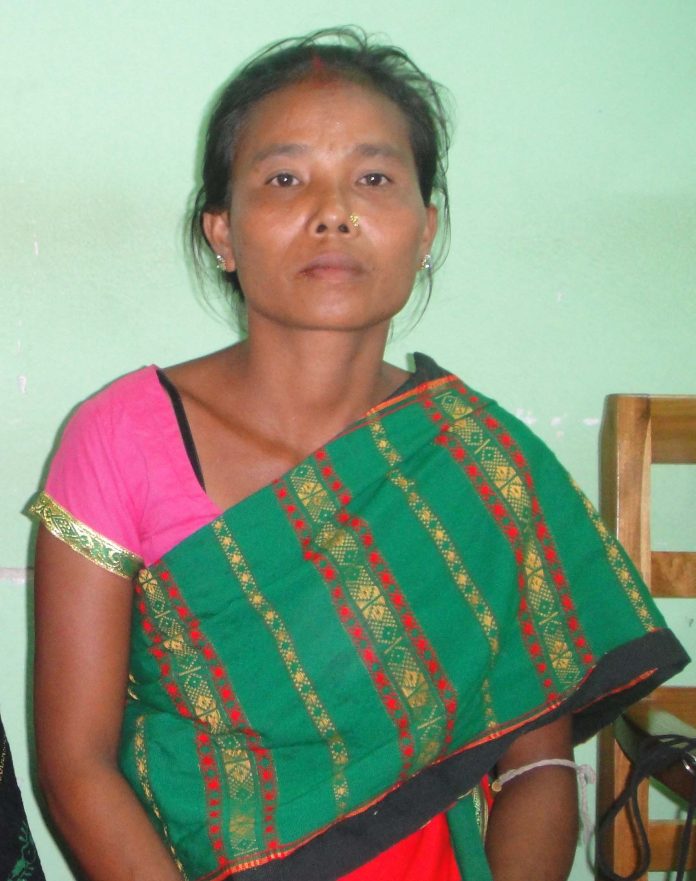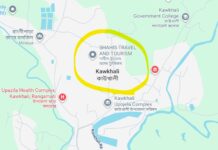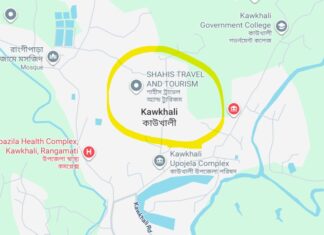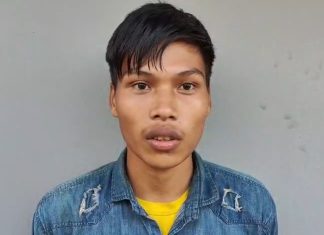Feature: Issue 01/2014: Saturday, 24 May 2014
chtnews.com
Land and forest are considered common property of the indigenous Jumma people in the Chittagong Hill Tracts. It was the British who introduced the concept of personal property in land in the CHT. Although over the last one hundred years or so the system of individual ownership in land has become predominant, the custom of communal ownership is still prevalent among the Jumma inhabitants. Many are still dependent on the forest for their subsistence. But this common property of the Jumma people has been an object of encroachment by outsiders. The Kornel Bagan (colonel garden) is one instance of such recent encroachments.
Developed on common land of the Jumma villagers and spread over 90 acres, the Colonel Garden is owned by Quamrul Haq, a former colonel of the Bangladesh Army. It is located at Porshuram Ghat under Ramgarh Upazila in Khagrachari district. Two years ago, before the land was planted with mango and litchi trees, it was covered with lush green natural forest, a source of livelihood for the nearby Jumma inhabitants, who had preserved this forest land for centuries. But Quamrul, who uses his connection with the army and the local civil administration to occupy Jumma’s land, is not content with these lands. He wants more and to achieve his objective he continues to plot to encroach upon the remaining lands of the Jumma villagers. Thus the inhabitants of a number of villages in Patachara area including Manikchadra Karbari Para, Jumchara Karbari Para, Buddha Dhan Karbari Para, Kumindra Karbari Para face eviction from their traditional habitat.
In order to occupy more land for his garden, Quamrul colluded with the army and local administration. This has resulted in an increase in repression against Jumma villagers, who do not know where they should go for the redress of their grievances.
Salindra Tripura, a resident of Jumchara village and a victim of the greed of Qumrul, says:
“On the night of 14 March, at 12 midnight to be exact, the employees of Colonel Garden led by Md. Junab Ali, the caretaker of the garden, mounted an attack on our village, burning down our houses. After burning down our houses, they also torched the security guard’s house of the garden intentionally and the following day filed a criminal case against us, accusing us of burning down of the security guard’s house. They caught Debendra Tripura and Kumendra Tripura, who were implicated in the case, before handing them over to the police. The employees of the Colonel Garden, who happen to be illegal Bengali settlers, are doing these in close co-operation with the army and the local civil administration. They all want us to leave our village.”
Debendra Tripura and Kumendra Tripura are now out on bail after remaining in jail for more then one month, but many others, including the Karbaris or chiefs of the villages, may be arrested any time as they are also included in the case as accused. Interestingly, the First Information Report (FIR) referred to them as ‘land thieves’!
Regarding the conspiracy to illegally occupy the remaining lands of the Jumma people in Patachara area, Ms Parabala Tripura, a resident of Manikchandra Karbari Para, said:
“The caretaker of the Colonel Garden first proposed that we should sell out our bumpy lands to them. When we refused the proposal, they began plotting to evict us.”
Ms Parabala has only five acres of hilly or bumpy land left. But the heartless, greedy ex-colonel, whose thirst for land seems insatiable, now wants it too.
The nexus between the military and civil administration on the one hand and the people of the Colonel Garden on the other is strikingly evident in the arrest of a village chief and his son-in-law. The arrest was made on 16 April 2014 during an overnight raid in the house of Pusta Kumar Tripura, the chief of the village of Manikchandra Para, and his son-in-law, Chaila Marma, who was visiting his father-in-law’s house with his wife. They were arrested on charge of possessing an unlicensed gun and two rounds of bullet. The papers relating to their case reveal that Pusta Kumar Tripura’s wife Kenubala Tripura is mentioned as a witness, and that too against him and their son-in-law! We made an investigation as to how an innocent and credulous Kenubala, became a direct witness against her husband and found an amazing story that any box-office hit Bangladeshi movie will pale to it. To let the readers know this story, we can’t help reproducing the statement of Kenubala Tripura, who, until we revealed it to her, was unaware of her becoming a witness. The statement is quite long, but for a better understanding of the whole matter, it is worth reading. This is what she has to say:
“That night we were all asleep. Deep at night, I awoke when I heard someone calling ‘brother, brother’, and knocking on the door. It was about 2am. It was a man’s voice and he said, ‘Please open the door’. When we hesitated to open the door, he said ‘If you don’t open the door yourselves, we will break it open.’ We were all frightened to our bones, but somehow I pick up some courage and opened the door and saw army soldiers all around our house. One of them asked me how many of us were living in the house. I said, ‘We are five members plus my older daughter and her husband, who came from Khagrachari to celebrate Boisu festival.’ Then he ordered all of us to come out. We obeyed him, but moments later I argued with him and went inside to see what they were doing. I followed them inside the house. They tried to send me out, but I insisted on staying there, saying, ‘Please beat me if you wish, but I am not going to go out.’ I saw the army turning the rooms upside down, throwing our clothes all around and making a mess of our beds. It was as if they were searching for something. Along with the army, there were two persons, who had covered their faces with gamcha (kind of a napkin). I was staring into their faces. They too were glancing at me from time to time. At first, when after searching the beds and the granary, the army found nothing, they came out, but only to enter again moments later. I followed them too. A little later one of the two masked men stood in front of me so that I could not see what they were about to do. I moved from there and stood in front of him and saw that the other masked man was making some gestures with his hands. Then he moved near the empty granary, took out something from his waist and put it over there. After that, some soldiers went there and began shouting, ‘We’ve got it, we’ve got it’. They showed a pistol and two rounds of bullet. I cried to them: ‘No, I’ve seen that masked man put down the gun and the bullets over there.’ I kept on arguing with the army, saying, ‘You have placed the gun and the bullets inside the granary and now taking my husband and my son-in-law away.’ One of the soldiers shouted at me: ‘keep quiet, or we’ll make things worse for you.’ Then they boarded them on their vehicle and drove away. I ran after them up to the road and shouted: ‘Take me too”. I wept all night.
The following morning I went to Ramgargh police station. Some of our village folks including a leader of the Tripura Sangsad were along with me. The police asked me to sign on a sheet of paper. The Tripura Sangsad leader also told me to do so. I thought my husband and my son-in-law would be released if I signed. I am an uneducated woman. In the police station I heard that a case had been lodged against my husband and my son-in-law on charge of possessing firearms, that these gun and bullets had been recovered by army in our house and that we were a terrorist family.”
This is how Kenubala Tripura ended up being a witness against her husband. Her story also depicts a picture where the police, the army and even some crooked leaders of the indigenous people have teamed up against the innocent Jumma people. This also shows the extent to which the army can go to defend the interests of the Bengali elites.
The local Jumma inhabitants believe, and rightly so, that the army is helping the terrorist gang of the Colonel Garden by conducting searches, arresting innocent villagers and lodging false criminal charges against them. The aim of all this is to instill a fear psychosis among the Jummas so that they do not dare to protest against any injustice and are forced to leave the area. [End]












